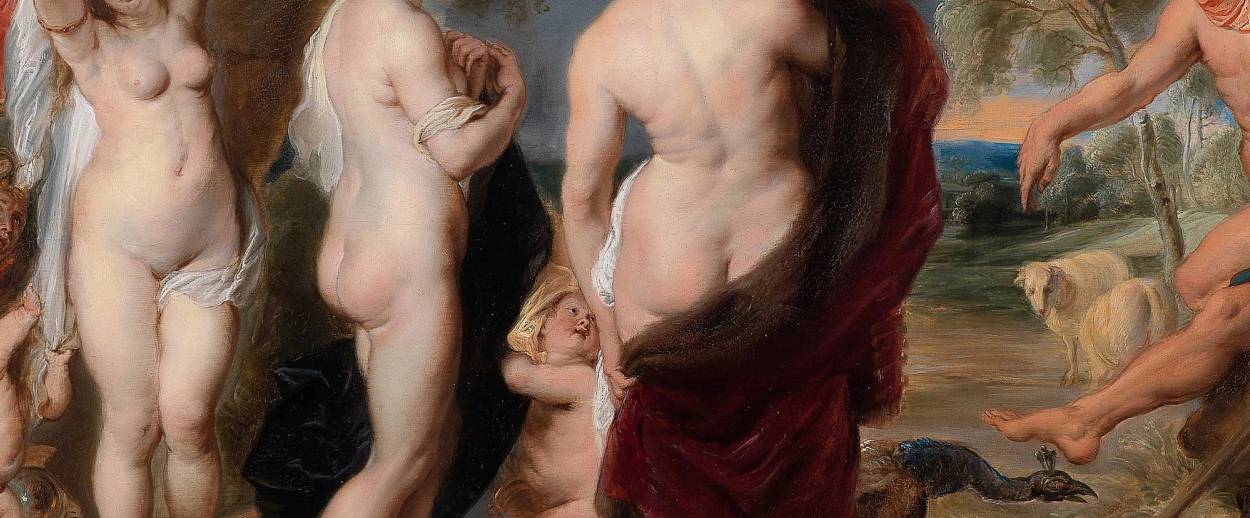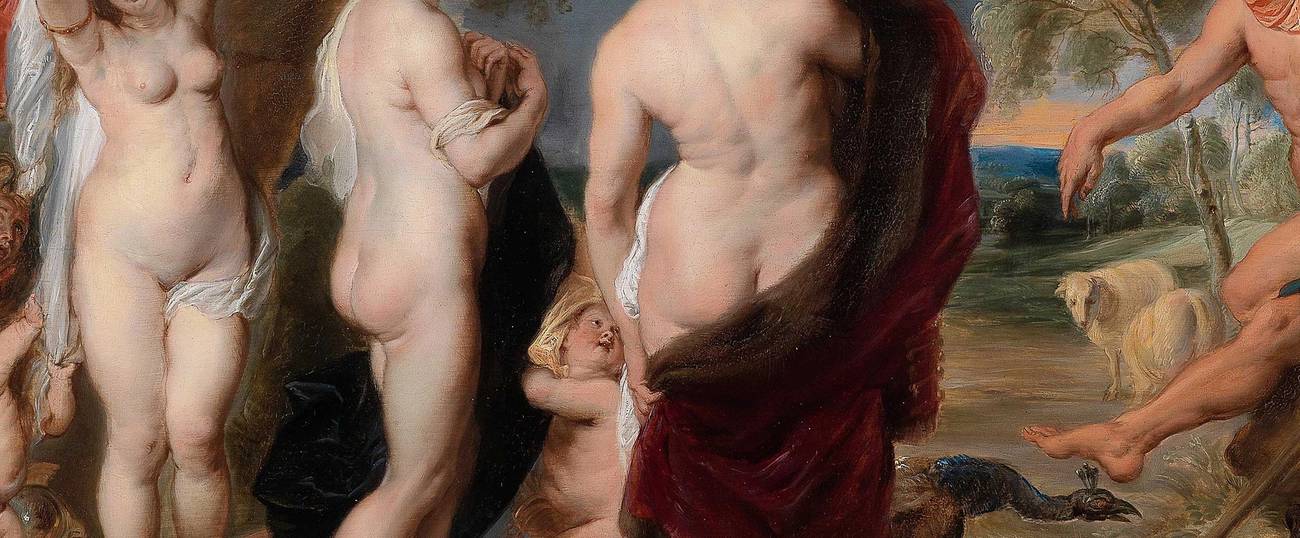Portrait of a Fat Jew
‘Flesh,’ Brigid Brophy’s reissued 1960s novel of middle-class intellectuals, is a psychosexual, art-historical, Rubenesque frolic through English anti-Semitism and suppressed sexuality




Jewish culture, mainly of the Eastern European flavor, has long become an inseparable part of America’s imaginative and comedic landscape. But England is different: It is a land in which exuberance of any kind is frowned upon, where the worst form of public rudeness is to stand out..England never imagined itself to be a nation of refugees. Uppermost in the minds of British Jews was the need to blend in. As a result, Jewish life has only rarely found expression in English literature, and when it has come, it has often been oblique, as in the ambiguously Jewish characters of Anita Brookner, or W.G. Sebald’s Jacques Austerlitz: intellectual, quiet, vaguely Semitic.
That desire to keep a low profile is perfectly skewered in Brigid Brophy’s 1962 novella Flesh, an arch, subversive tale of marriage and out-of-control obesity in North London. Little known outside of the United Kingdom and out of print for some years, it is a hidden gem of British-Jewish literature. Brophy, who would have been 89 on Tuesday, was a puckish and brilliant writer who wrote on a plethora of themes, frequently returning to a triad of opera, sexuality, and psychoanalysis. She started a classics degree at Oxford but was expelled after less than a year. “I came down at the age of 19 without a degree and with a consequent sense of nudity which I have never quite overcome,” she claimed, but she quickly leaped to the forefront of the intellectual scene in Swinging London. She corresponded frequently with the literary stars of the age, wrote cutting book reviews and critical appreciations, and was an activist for an eclectic range of causes.
Flesh was the author’s second novel after Hackenfeller’s Ape, an utterly Brophian story about a scientist singing Mozart to a caged ape to encourage him to procreate. A superficially tamer tale about art and gender roles, Flesh revolved around a pair of self-abnegating, middle-class Jewish intellectuals. The first, Marcus, is a shy and awkward young man, educated but aimless, and coddled to the point of uselessness by his doting immigrant parents. Although he does possess one true gift—an aesthetic sense bordering on obsession, a delight in the beautiful and sensual “to the point of agony”—he seems doomed to keep it to himself. He drifts through life on the coattails of his more socially accomplished sister, sure that people do not want him around but unwilling to make a scene by leaving. It is at one such event, “hemmed in by other people’s backs and jammed in a corner between a bookcase and a table of food,” uncomfortably holding a glass he has nowhere to put down, that he meets Nancy.
Nancy, confident and worldly, brushes over Marcus’ social clumsiness with ease. We learn little about her (Marcus’ appearance is described in depth; Nancy’s not at all), but she is intellectually his superior. She studied at the LSE, taught violin, and speaks excellent French. She is sexually experienced. The division of labor is clear: “where [Marcus] was aesthetic, Nancy was intelligent.” Nancy’s background is slightly posher than Marcus’. Her father is known to the neighbors as the Commander (he “seems to have spent the war being brave,” as she puts it), and her parents belong to a “much higher—and freer—social class.” Without any kind of courtship, they begin to spend more time together, to the great relief of Marcus’ immigrant family, who feel at sea in England (they appear to have come from Germany some time before the war) but possess an almost religious veneration toward their son.
As Nancy’s influence on Marcus grows, he begins to change spiritually and physiologically. His speech becomes slower but more self-assured. He begins to smoke and drink and put on weight. Part of this is his new sense of belonging with Nancy at his side—she teaches him how to dance, and soothes his anxiety during the thorny first night of their honeymoon in Italy, replacing his nerves with a rush of virile achievement. But it is also dissipation born of happiness, a rejection of his past failed life as a Jewish intellectual: Now he is closer to Falstaff than Bernard Berenson.
At all times, the social ramifications of Jewishness are present. Nancy and Marcus both yearn to escape from North London, where the houses all smell of the same furniture polish; when they purchase a flat from a couple in Chelsea, Marcus sees “that Nancy was displeased that they were Jews.” In a terrific scene that embodies the book’s tone, Nancy enters the drawing room to see Marcus kneeling with his face in a take-home work project, a green silk chinoiserie bought for appraisal. Nancy tells him “in the traditional manner of a Victorian lady receiving a proposal of marriage from a physically repugnant suitor … ‘You look like an old Jew merchant,’” to which he replies, “I am an old Jew merchant.” Nancy’s austere gaze places her husband into a tradition she would be free of: the wheedling, shiftless Jewish peddler, unable or unwilling to shake the otherness of his Oriental descent.
Marcus’ great love is art, and his favorite painter is Rubens, the Flemish Baroque master inextricable from the “great blond areas of flesh” (in Marcus’ words) he lends his name to. Nancy and Marcus mention his paintings of The Judgment of Paris—in which the Trojan hero appraises three goddesses—as they consider prospective au pairs. Rubens’ brush, along with the viewer’s eye, lingers over their nude bodies, rippling and ruddy, a stark contrast to the centerfold exoticism of, say, Titian’s Venus of Urbino, yet still clearly present as objects of desire, the vanguard of an early modern shift from the classical to the demotic.
In the latter part of his career, Rubens married his 16-year-old niece Helena, a renowned beauty, and produced one of his most unusual, intimate paintings, in which his young bride poses naked except for “Het Pelsken,” a fur coat. This portrait of conjugal love is highly unusual by the standards of the time, a nude not symbolically “clothed” by classical or biblical signifiers. Brophy’s great manipulation of this art historical trope is to reverse it, foregrounding the female gaze on an undulating, sexualized male body. From the moment he is engaged to Nancy, his body begins to fill out, and by the novel’s close Nancy is surprised to discover her husband—all corpulent, naked mass—still desirable. “Just look at yourself,” she says. “Look at your thighs. Look at your chest. You’ve got great pendulous breasts, like a woman.” Marcus is unperturbed. “It’s a process of empathy. I’ve become a Rubens woman.”
On some level, Rubens’ slightly later Baroque peer Rembrandt might be his very counterpoint. In place of bright colors and fleshy bodies, Rembrandt painted lined, blotched faces in dim browns and ochres, and opted for commonplace portraits rather than classical figures. It’s telling that after Marcus’ father dies, he briefly contemplates taking over the family dried-fruit business, but Nancy bristles. When Marcus suggests that prunes and raisins might in their own way be objets d’art (“they have a resemblance, you know, to certain faces of Rembrandt”), she counters, “You’re a Rubens man, not a Rembrandt man.” Marcus’ transformation will go only one way, toward the more “gentile” Rubens.
Flesh toys constantly with such symbolism, but is thin on dispositive statements. It’s clear, for example, that it is about gender in some sense; yet it isn’t fundamentally misandric. At the book’s core is the fluidity and subjectivity of bodies; and the contours of Rubens women, a symbol of aestheticism, decadence, and feminine ideation. Marcus dons traditional femininity in his passive role in the relationship, and his objectification, but never do we sense that this is something he’s uncomfortable with. Brophy herself had an open marriage with the art historian Michael Levey (“Why Wed at All?” was People magazine’s take on it in 1974), and was openly bisexual. “The cure for sexual jealousy,” she said, “is sexual generosity.” It seems reasonable to read at least some biographical information into Flesh. “So very much of Marcus is my father, and he was always assumed to be Jewish, with Levey as a surname,” Brophy’s daughter Kate told me by email. (He was in fact Irish Catholic.)
It’s easier to convey this book’s strangeness than its style and wicked humor, and it is the latter that make Brophy’s writing so hard to analyze. For European Jews in the early 1960s, the recent past contained a lot of trauma that was still taboo. There are some references to this in Flesh: Marcus doesn’t want to hire a German au pair, even if, as Nancy points out, “the sort of girl we’d get was only 5 or 6 in 1945.”
How much of the Jewish self-loathing contained in this book can be read as a dark, oblique glimpse at a community afraid to be Jewish, how much as simple parody? With Brophy’s ironic nature in mind, it is tempting to say that Flesh is essentially a jape, a feminist novel of tables turned, with the characters’ Jewish identity a diverting side plot. Yet there is a certain daring in Brophy—the vegetarian and animal-rights activist, the bohemian and nonconformist—peeking inside and writing the anxieties and contradictions of London Jews just 20 years after the Holocaust, painting them in a way that perhaps only an outsider could.
***
You can help support Tablet’s unique brand of Jewish journalism. Click here to donate today.
Josh Friedlander is a writer living in Tel Aviv.